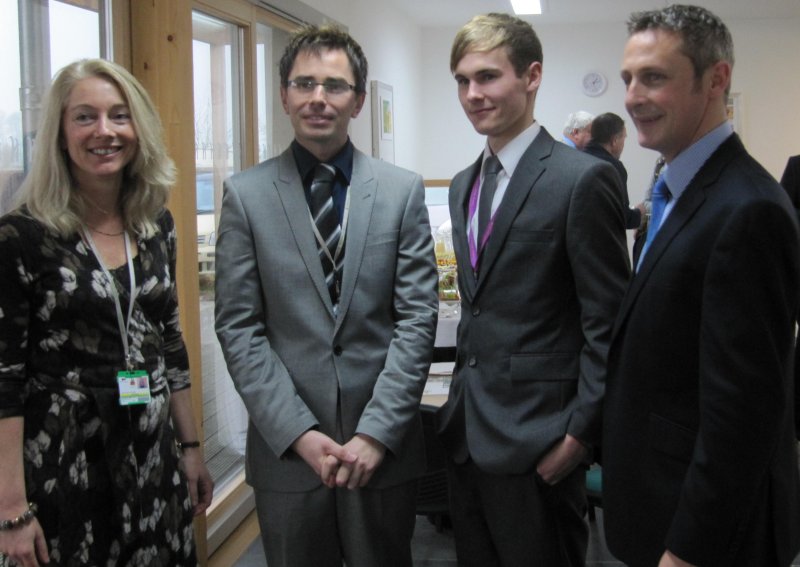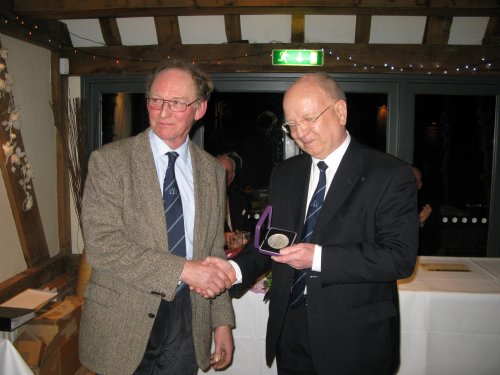

Another busy week.
 On Tuesday morning The English Apple Man attended the presentation of The Thanet Earth Discovery Fellowship to Tom Pilcher at Hadlow College. This prestigious fellowship has been made possible by a close liaison between Thanet Earth andHadlow College. The initiative has been driven by the need for every fresh produce supplier to offer a constant programme of innovation and new product development. This is hugely important for Thanet Earth and by working closely with Hadlow the company is seeking to achieve these goals for its core business and give a student an opportunity to 'kick start' their career in commercial growing.
On Tuesday morning The English Apple Man attended the presentation of The Thanet Earth Discovery Fellowship to Tom Pilcher at Hadlow College. This prestigious fellowship has been made possible by a close liaison between Thanet Earth andHadlow College. The initiative has been driven by the need for every fresh produce supplier to offer a constant programme of innovation and new product development. This is hugely important for Thanet Earth and by working closely with Hadlow the company is seeking to achieve these goals for its core business and give a student an opportunity to 'kick start' their career in commercial growing.
Presentations from Rob James, Technical Director of Thanet Earth, Sarah Morgan, Faculty Manager Horticulture, Hadlow College, & Alan Harvey, Degree Programme Leader Horticulture, Hadlow College, preceded the announcement of Tom Pilcher as the winner of The Thanet Earth Fellowship by Pat Crawford, Press Officer, Hadlow College.
Rob James made the presentation to Tom Pilcher, who responded with a very accomplished acceptance speech.
Dr. David Pennell, Horticultural Consultant and R&D columnist for "The Commercial Greenhouse Grower" summarised the importance of attracting high quality young people into the horticultural sector. Our future depends on bright young people entering our colleges and committing to careers in horticulture. The future is very bright and it is very important the opportunities for well paid, satisfying careers in the 'broad structure' of horticulture is publicised. So often horticulture is not recognised by the educational and career advisory sector and is placed low down on the list of career opportunities.
Tom will start his 9 month placement on Monday of next week and will be straight into working with plants at Thanet Earth's glasshouses.
All of us in the Horticultural sector earnestly hope the recent negative fixation will become a thing of the past and Tom Pilcher will be at the vanguard of an explosion of interest in a horticultural career!

 Tuesday evening and I am off to East Kent to attend the AGM and Annual Dinner of East Kent Fruit Society, taking with me John & Rosemary Breach. John would receive the 2011 David Hilton Memorial Medal for outstanding service to the Top Fruit industry.
Tuesday evening and I am off to East Kent to attend the AGM and Annual Dinner of East Kent Fruit Society, taking with me John & Rosemary Breach. John would receive the 2011 David Hilton Memorial Medal for outstanding service to the Top Fruit industry.
After the formal proceedings and the presentation of the trophies to winners of the 2011 orchard competitions, we tucked in to an excellent dinner. Soup, roast beef and Bramley apple pie.
Presenting John with the Medallion, David Simmonds EKFS Treasurer reviewed John's many achievements. Born into a fruit farming family at East Grinstead in West Sussex in 1945, a farm his father subsequently sold, before buying a hop farm near Tunbridge Wells in Kent. His father then fulfilled a long held ambition, when he 'upped sticks' and took the family off to the antipodes in 1956, where he bought a fruit farm in Tasmania, before finally settling back in the UK at Staplehurst in West Kent in 1959.
John left Skinners School in Tunbridge Wells in Kent in 1964 and gained a 2 year course at East Malling Research. John then 'sowed the seeds' for his long term future in the nursery business when he spent a period of work experience with the legendary Charles Andre at Villers-Cotterêts in the Picardy region of France, where he worked from 1966-1967.
On his return from France John worked briefly on the family farm, with his elder brother who had followed their father into fruit farming. Before, and largely because his father was supplying Strawberries to Woolworth, John had an opportunity to join Woolworth as a trainee manager, which gave him an insight into how large retail operations work. He remarks now that he did not particularly enjoy that 'corporate' world and left to develop the tree wholesaling business he had been developing 'on the side' with his father.
Back home in Staplehurst, working again with his father, John founded J.R. Breach in the late 1960's after his father had imported and sold some trees onto English growers. John built a very successful wholesale business importing trees from Charles Andres Pépinières du Valois Nursery and establishing himself as a very respected member of the English Top Fruit fraternity. The Valois nursery is now owned by Bruno Essner, Charles Andre's 'protege' and successor.
In the 1980's John took an increasing interest in the politics of our industry, and concerned the smaller growers not aligned to large marketing organisation were in danger of being disadvantaged, created BIFGA (The British Independent Fruit Growers Association) in 1988 and over the last 25 years his determination to 'fight the corner' of the independent grower has made BIFGA a force to be reckoned with.
Membership of BIFGA now stands at 214 a considerable achievement when one considers the rapid decline in apple growers over the last quarter of a century.
Another creation of John's was the Farm Folk childrens books inspired by the bedtime stories he created for his son Peter.
John's love of all things apple, and a natural curiosity has led him to search for new varieties. His close association with Valois Nurseries and their involvement in breeding programmes has resulted in the introduction of new varieties; his latest 'baby' is CHEERFUL GOLD which he bred from a seed. The parents of Cheerfull Gold are Cox and Golden Delicious. The speed with which a new variety moves from a seed to a commercial proposition is endorsed by the fact that the variety was bred in 1979; 30+ years ago. Many years of evaluation pass before the breeder and nurseryman feel confident enough to launch the new variety.
John Breach is a very deserved recipient of The David Hilton Memorial Medallion.
BIFGA Technical Day.
Following articles in last week's Journal, I report on the presentation by David Gardener of The CO-OP. David is based in Stourton in Leicestershire, but he said, as with so many busy people today, he works from his laptop PC, wherever that happens to be!
As head of fruit operations he is part of the senior management team, with responsibility for the CO-OP's fruit business and the development of young people within the business.
The CO-OP was established in 1844 with CWS in 1860. It is and always has been owned by its members.
Extracts from The Cooperative website.
"The Group operates 4,800 retail trading outlets, employs more than 106,000 people and has an annual turnover of more than £13billion".
"We have over 3,000 food stores and supermarkets around the UK. The Co-operative's own-brand food range combines great quality with honest and ethically sourced products. We are the only retailer to sell food grown on our own farms, and we are the biggest supporter of Fairtrade with over 200 lines. That's why we are proud to be ranked the top ethical supermarket in the UK - proof of our commitment to responsible retailing. That's why we're good with food".
David recounted the changes throughout the 20th century. In 1896 most produce was bought in, but during the 1920's & '30's the business ventured heavily into Cereals, Peas, Fruit, Vegetables and particularly Potatoes. Today they grow and process 90,000 tonnes of Potatoes for the Cooperative retail stores.
Three years ago, a major change of direction occurred with the acquisition of Highland Court Farm near Canterbury in Kent. The Coop took on the farm on a 20 year leasehold. Historically the farm has produced Apples, Pears, Stone Fruit, and Blackcurrants. The most important crops are apples & blackcurrants. The farm has an established packhouse and 3,000 tonnes of C/A storage.
Much of the top fruit is on older trees and under the Coop management, an extensive re-planting programme is in place, with 20 hectares of new orchards planned each year. The first planting took place in the spring of 2011 with 75,000 trees planted. 120,000 trees are being planted this winter 2011/2012.
In his role as leader of the Coop's development programme for young people, he has instigated; "A Graduate programme" centred on Harper Adams College, and "An Apprenticeship programme"
The apprenticeship is a two year course entailing four 'secondments' Growing, Retail, Labour Management and Packhouse Management. The objective is to find young people with 'green fingers' a desire to 'get things done' and a vision of a 'future' in the growing business.
Sadly, and very much in keeping with the experience of other institutions; it has been a struggle to recruit candidates. David's policy is not to take on anyone who does not have the ability and desire to make a career in horticulture. Very few think about making a career in Fresh Produce, but David stressed there are much better opportunities in Fresh Produce than in Agriculture or Livestock. The Coop sponsors Scholarships at Harper Adams (fees fully paid for 2 years) with an option on a third year and a Graduate scheme. Building a key relationship with the college is paramount. The apprenticeship scheme was launched in 2011, but sadly there has been a high drop out rate.
It is sad in these times of high youth employment, that an excellent career opportunity with The Coop where the possibility of promotion through the wider business is extensive that young people are not 'beating a path' to David's door.
Chile
David Gardener followed his overview of the Coop with a brief report on his recent visit to Chile. A country 3,000 kilometres long by 100 miles wide has a mix of climates like no other country. David described the bountiful growing regions of Chile as the California of The Southern Hemisphere.
Key to production in Chile is; "will it travel" as 80% of the worlds population lives in the Northern Hemisphere. In 1980 Chile exports accounted for 2% of SH exports, today its 50%. How the supply of produce has changed in the last 30 years!
Chile now grows 300,000 hectares of fresh produce, 4,400 hectares are apples and everything is irrigated. There are 250 hectares of Cherries in production and a further 250 hectares yet to come into production. Yields comfortably reach 15 tonnes per hectare and 25 tonnes is possible. It is common to find 700 acre fields of apples with yields of 60 tonne per hectare achieved. Sunburn is the biggest problem and growers 'tweak' the rows to maximise the natural shade.
Gala, Pink Lady and Fuji are the leading varieties of apple. David saw the production of apples in bags; e.g. using the system commonplace in Japan, fruitlets are covered with an individual bag, keeping the fruit out of the sun and creating a perfect skin finish, then near harvest removing the bag to develop just the right amount of colour on a perfect surface. These 'bag grown' apples command a very high price in particular southern Asian countries.
And finally two reports of falling sales of fresh food.
Fruit and veg sales tumble as health push falls on deaf ears!
Fruit and veg consumption has continued to fall in the UK, with Brits buying 0.9% less in 2010 than they did the previous year.
Purchases of fruit and veg were 7.5% lower in 2010 than in 2007, new figures from Defra show, and down 8.7% on 2006 levels.
Poor households have cut back the most, with those in the lowest income bracket buying almost a third (30%) less fruit and veg in 2010 than in 2006.
Fruit bore the brunt of the cut, purchases falling by 11.6% between 2007 and 2010, while vegetable sales slipped by less than 3%. But fresh green vegetables also saw significant reductions, with purchases down 4.5% on 2009 and 15% on 2007.
Source: The Grocer
Fruit and vegetable purchases nosedive among poorer families.
Poorer families in Britain have cut the amount of fruit and vegetables they buy by almost a third to consume little over half the recommended five portions per day.
Households in the lowest income bracket consistently bought smaller and smaller quantities of fruit and vegetables between 2006 and 2010, the most recent year for figures released by DEFRA.
Fruit purchases among families on the lowest incomes fell 30 per cent at just 2.7 portions per person per day. The amount spent on food in the bracket peaked at 16.8 per cent in 2008, before falling back to 16.1 per cent in 2009 and 15.8 per cent in 2010.
The DEFRA survey suggests this was possibly due to households finding ways to trade down to cheaper products.
The survey also looked at home-grown food, and found that between three and four per cent of fresh fruit and veg entering the household in 2010 came from free sources, mainly gardens and allotments.
"Fresh beans, which include broad, runner, and French varieties, had the highest proportion with 31 per cent being home-grown. Home-grown fruit and vegetables have been relatively constant across the last four years," the report stated.
In 2010, the amount spent per person per week on fresh and processed potatoes was £1.13, with £4.41 on fruit and vegetables excluding potatoes.
Expenditure on vegetables excluding potatoes in 2010 was £2.30 per person per week, while 23p was spent on fresh apples and 32p on pure fruit juices.
Meanwhile health secretary Andrew Lansley has announced that councils are to be given more than
£2 billion to tackle public health issues including obesity as part of NHS reforms. It is the first time since 1974 that local authorities have been given responsibility for public health, and a focus on diet and obesity is expected as part of the initiative.
Source: Freshinfo![]()
That is all for this week,
Take care
The English Apple Man